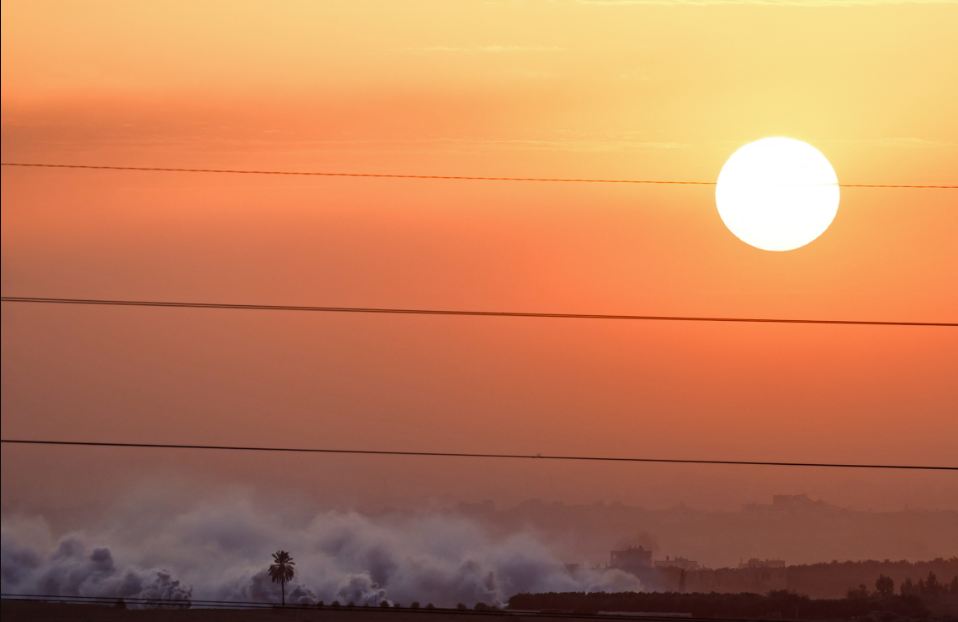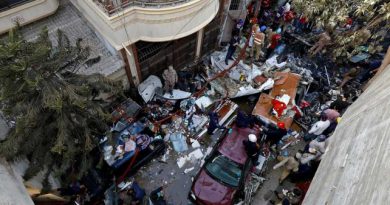Israel wages ground campaign in Gaza, communications blackout eases
Jerusalem/Gaza (Reuters) – Israel is expanding ground operations in Gaza and its fighter jets have struck hundreds more Hamas targets, the Israeli military said on Sunday, in what Prime Minister Benjamin Netanyahu has called the second phase of a three-week-old war.
Telephone and internet communications were partially restored in Gaza after a more than day-long blackout that had badly impacted rescue operations as Israel pounded targets of the militant Hamas group that controls the territory.
“Israel cut us off from the world in order to wipe us out, but we are hearing the sounds of explosions and we are proud the resistance fighters have stopped them at meters distance,” said Shaban Ahmed, a public servant who stayed in Gaza City despite an Israeli warning to evacuate south.
Ahmed said he only found out on Sunday that his cousin had been killed in an air strike on Friday because of the blackout.
Israeli Defence Force (IDF) fighter jets struck over 450 military targets belonging to Hamas in the Gaza Strip, including operational command centres, observation posts, and anti-tank missile launch posts, the military said.
“We are gradually expanding the ground activity and the scope of our forces in the Gaza Strip,” military spokesman Daniel Hagari told a briefing. “We will do everything we can from the air, sea and land to ensure the safety of our forces and achieve the goals of the war.”
Israel has tightened its blockade and bombarded Gaza for three weeks since Hamas militants killed at least 1,400 people and took more than 200 hostage in an Oct. 7 cross-border attack.
Medical authorities in the Gaza Strip, which has a population of 2.3 million people, said on Sunday 8,005 Palestinians – including 3,324 minors – had been killed in Israel’s campaign to obliterate the Iran-backed Hamas militants.
Western countries have generally backed what they say is Israel’s right to self-defence. But there has been a mounting international outcry over the toll from the bombing and calls for a “humanitarian pause” to allow aid to reach Gaza civilians.
White House national security adviser Jake Sullivan told CNN that Israel must use every means possible to distinguish between Palestinian civilians and Hamas militants in Gaza, and he also urged Netanyahu to “rein in” extremist Jewish settler violence against innocent people in the occupied West Bank.
Pope Francis on Sunday called for a ceasefire and renewed his call for the release of all hostages.
British Prime Minister Rishi Sunak and French President Emmanuel Macron expressed their concern about getting aid into Gaza during a phone call on Sunday, Sunak’s office said.
Shortages
With supplies of food, water and medicines running low and much of Gaza reduced to rubble, thousands of residents broke into warehouses and distribution centres of the United Nations Palestinian refugee agency (UNRWA) grabbing flour and “basic survival items”, the organisation said on Sunday.
Israel will allow a dramatic increase in aid to Gaza in the coming days and Palestinian civilians should head to a “humanitarian zone” in the south of the tiny territory, said Colonel Elad Goren of Cogat, the Israeli Defence Ministry agency that coordinates with the Palestinians.
The Palestinian Red Crescent said on Sunday 10 Egyptian trucks carrying food and medicine had arrived in Gaza via the Rafah crossing, bringing the total number so far to 94, a small fraction of what is needed.
Displaced Palestinians staying in tents in Gaza’s Khan Younis described dire living conditions, with little access to food and water and having to queue hours for the toilet.
“I wish God will have mercy on us and the war stops,” said Rami Al-Erqan, a father cradling his daughter, one of his six children. “We reached a state where we wish to have died under the rubble just to find some rest. Our life is torture.”
Central Israel also came under heavy rocket fire on Sunday, with sirens sounding in several major cities.
Al-Qassam Brigades, the armed wing of Hamas, said on its Telegram account that it was “bombing Tel Aviv in response to the Zionist massacres against civilians”.
They later said their fighters had clashed with Israeli forces northwest of Gaza and had also set fire to two Israeli tanks. There was no immediate word from Israel on the claims.
Netanyahu warned Israelis on Saturday to expect a “long and hard” campaign but stopped short of calling the current incursions in Gaza an invasion. Some of U.S. President Joe Biden’s aides have advised Israeli counterparts to hold off on an immediate all-out assault, U.S. officials say.
Netanyahu also pledged to spare no effort to free the more than 200 hostages, including foreigners, held by Hamas.
Protests
The conflict has prompted large demonstrations worldwide in support of the Palestinians. On Sunday several thousand people rallied in Beirut to show solidarity with Gaza.
The Palestinian Red Crescent said it had received warnings from Israeli authorities to immediately evacuate al-Quds hospital in the Gaza Strip, adding that raids conducted on Sunday had taken place just 50 metres from the facility.
The Red Crescent says some 14,000 people have sought shelter at the hospital from Israeli air strikes.
Israel has accused Hamas of locating command centres and other military infrastructure in Gaza hospitals, something the group denies.
Palestinian officials said around 50,000 people had also taken shelter in the Gaza Shifa Hospital and said they were concerned about ongoing Israeli threats to the facility.
Israel sent troops and tanks into Gaza on Friday night, focusing on infrastructure including the extensive tunnel network built by Hamas. The military provided no details on the size of the deployment.
Israel’s chief military spokesperson declined to say whether Israel had been behind the telecommunications blackout but said it would do what it needed to protect its forces.



